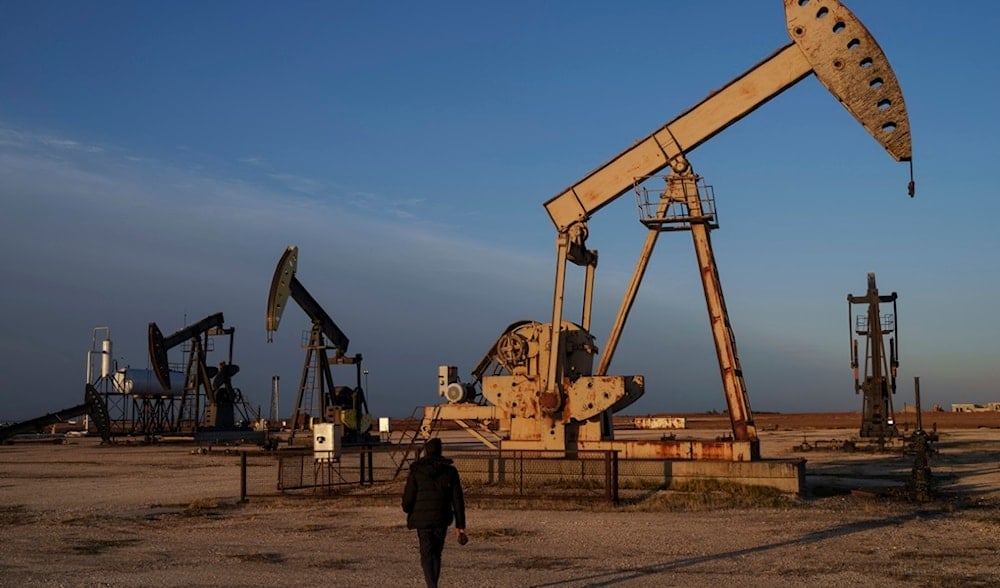CNBC unveils strategic plan to revitalize Syria energy sector with US
A strategic plan has been uncovered to revive Syria's energy sector through collaboration with US companies, focusing on infrastructure rehabilitation, energy security, and economic integration.
-

A worker walks past idle pumpjacks at an oil field on the outskirts of the northeastern Syrian city of Qamishli, on February 3, 2025. (AP)
A comprehensive strategic plan has been introduced to rejuvenate Syria's oil and gas sector, emphasizing collaboration with American companies. Central to this initiative is the establishment of SyriUS Energy, a joint Syrian-American enterprise aimed at rebuilding the nation's energy infrastructure.
This entity is slated for listing on the US stock exchange, with Syria's sovereign energy fund holding a 30% stake, as per details released by CNBC Arabia.
Five-Phase implementation strategy
The plan outlines a five-phase approach:
-
Asset Recovery and Security
Securing priority oil fields such as Omar, Taym, Tanak, and al-Hasakah, along with assessing pipelines, refineries, and power lines. -
Stabilizing Domestic Supply
Rehabilitating the Homs and Banias refineries and expanding access to natural gas for households and power generation. -
Establishing a Public-Private Partnership
Forming a publicly listed company to manage assets, fostering partnerships between Syrian authorities and major US energy firms like ExxonMobil, Chevron, and ConocoPhillips. -
Governance and Transparency
Implementing robust governance structures to ensure transparency and attract foreign investment. -
Integration into Regional Energy Markets
Reconnecting Syria to regional energy trade routes, including the Arab Gas Pipeline, and enhancing export capabilities.
Objectives and expected outcomes
The strategic plan aims to:
- Provide reliable and affordable energy to Syrian citizens
- Create employment opportunities and develop local technical expertise
- Generate sustainable revenue streams for national reconstruction and essential public services
- Safeguard Syria's sovereignty over its energy resources
- Facilitate Syria's reintegration into regional and global energy markets
Financial considerations and challenges
Discussions are ongoing regarding financing mechanisms, with US sources highlighting potential obstacles and strategies to overcome them.
The plan's success hinges on navigating geopolitical complexities and securing the necessary investments to rebuild Syria's energy sector.
Regional deals to pump gas into Syria
Syria has secured several energy deals with different suppliers, including regional giants like Qatar and Turkiye.
In March, Reuters reported that Qatar is preparing to supply gas to Syria via Jordan in an effort to improve the country's strained electricity supply, according to three sources familiar with the arrangement. A US official confirmed that Washington had given its approval for the deal.
Last week, Syrian Interim Energy Minister Mohammad al-Bashir and Turkish Energy Minister Alparslan Bayraktar on Thursday signed a wide-ranging energy cooperation agreement, marking a significant development in bilateral economic relations focused on energy infrastructure and supply.
During a joint press conference in Damascus, al-Bashir stated that the agreement includes a protocol and general framework for coordination in various energy sectors, namely oil, natural gas, minerals, and electricity. The deal also covers joint scientific research and the exchange of technical expertise.
One of the key projects highlighted is the completion of a natural gas pipeline connecting Kilis in southern Turkey to Aleppo in northern Syria. The gas flow is scheduled to begin in June 2025, with Turkey set to supply up to 2 billion cubic meters of gas annually, expected to help generate approximately 1,300 megawatts of electricity.
The agreement also includes the finalization of a 400-kilovolt transmission line to link the Turkish and Syrian power grids, which is projected to support the import of up to 500 megawatts of electricity by early next year.
Additionally, a separate power line connecting Reyhanlı to Harem is under construction, with a substation expected to become operational by September.
Read more: High-level Syrian, Turkish delegations discusses bilateral ties

 4 Min Read
4 Min Read










